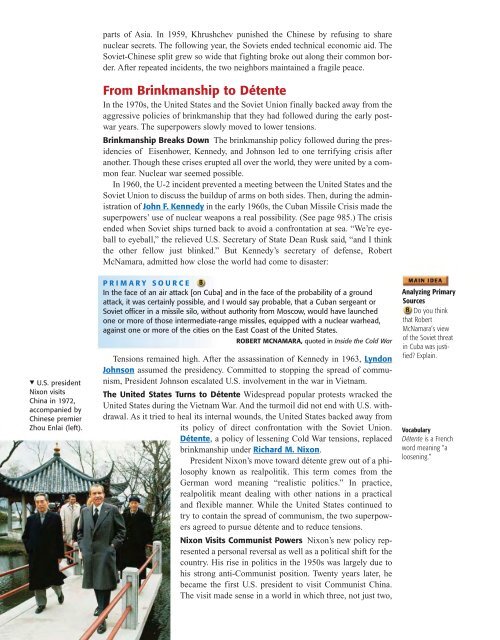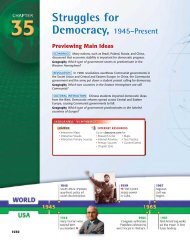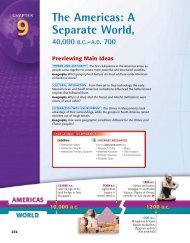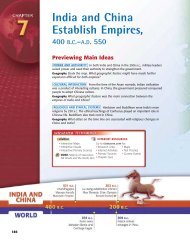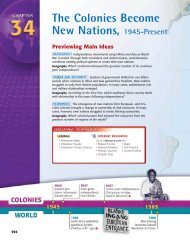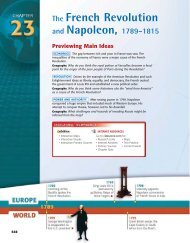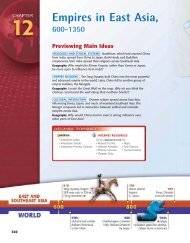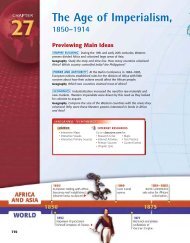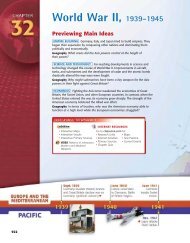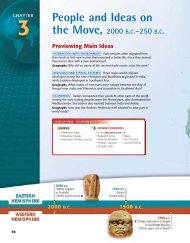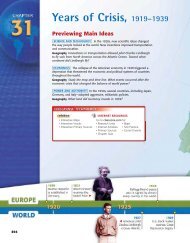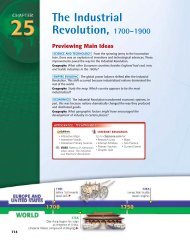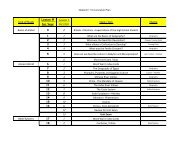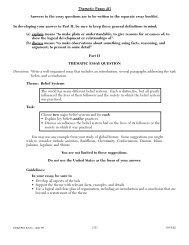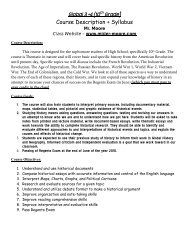Restructuring the Postwar World, - First
Restructuring the Postwar World, - First
Restructuring the Postwar World, - First
Create successful ePaper yourself
Turn your PDF publications into a flip-book with our unique Google optimized e-Paper software.
▼ U.S. president<br />
Nixon visits<br />
China in 1972,<br />
accompanied by<br />
Chinese premier<br />
Zhou Enlai (left).<br />
parts of Asia. In 1959, Khrushchev punished <strong>the</strong> Chinese by refusing to share<br />
nuclear secrets. The following year, <strong>the</strong> Soviets ended technical economic aid. The<br />
Soviet-Chinese split grew so wide that fighting broke out along <strong>the</strong>ir common border.<br />
After repeated incidents, <strong>the</strong> two neighbors maintained a fragile peace.<br />
From Brinkmanship to Détente<br />
In <strong>the</strong> 1970s, <strong>the</strong> United States and <strong>the</strong> Soviet Union finally backed away from <strong>the</strong><br />
aggressive policies of brinkmanship that <strong>the</strong>y had followed during <strong>the</strong> early postwar<br />
years. The superpowers slowly moved to lower tensions.<br />
Brinkmanship Breaks Down The brinkmanship policy followed during <strong>the</strong> presidencies<br />
of Eisenhower, Kennedy, and Johnson led to one terrifying crisis after<br />
ano<strong>the</strong>r. Though <strong>the</strong>se crises erupted all over <strong>the</strong> world, <strong>the</strong>y were united by a common<br />
fear. Nuclear war seemed possible.<br />
In 1960, <strong>the</strong> U-2 incident prevented a meeting between <strong>the</strong> United States and <strong>the</strong><br />
Soviet Union to discuss <strong>the</strong> buildup of arms on both sides. Then, during <strong>the</strong> administration<br />
of John F. Kennedy in <strong>the</strong> early 1960s, <strong>the</strong> Cuban Missile Crisis made <strong>the</strong><br />
superpowers’ use of nuclear weapons a real possibility. (See page 985.) The crisis<br />
ended when Soviet ships turned back to avoid a confrontation at sea. “We’re eyeball<br />
to eyeball,” <strong>the</strong> relieved U.S. Secretary of State Dean Rusk said, “and I think<br />
<strong>the</strong> o<strong>the</strong>r fellow just blinked.” But Kennedy’s secretary of defense, Robert<br />
McNamara, admitted how close <strong>the</strong> world had come to disaster:<br />
PRIMARY SOURCE<br />
In <strong>the</strong> face of an air attack [on Cuba] and in <strong>the</strong> face of <strong>the</strong> probability of a ground<br />
attack, it was certainly possible, and I would say probable, that a Cuban sergeant or<br />
Soviet officer in a missile silo, without authority from Moscow, would have launched<br />
one or more of those intermediate-range missiles, equipped with a nuclear warhead,<br />
against one or more of <strong>the</strong> cities on <strong>the</strong> East Coast of <strong>the</strong> United States.<br />
ROBERT MCNAMARA, quoted in Inside <strong>the</strong> Cold War<br />
Tensions remained high. After <strong>the</strong> assassination of Kennedy in 1963, Lyndon<br />
Johnson assumed <strong>the</strong> presidency. Committed to stopping <strong>the</strong> spread of communism,<br />
President Johnson escalated U.S. involvement in <strong>the</strong> war in Vietnam.<br />
The United States Turns to Détente Widespread popular protests wracked <strong>the</strong><br />
United States during <strong>the</strong> Vietnam War. And <strong>the</strong> turmoil did not end with U.S. withdrawal.<br />
As it tried to heal its internal wounds, <strong>the</strong> United States backed away from<br />
its policy of direct confrontation with <strong>the</strong> Soviet Union.<br />
Détente, a policy of lessening Cold War tensions, replaced<br />
brinkmanship under Richard M. Nixon.<br />
President Nixon’s move toward détente grew out of a philosophy<br />
known as realpolitik. This term comes from <strong>the</strong><br />
German word meaning “realistic politics.” In practice,<br />
realpolitik meant dealing with o<strong>the</strong>r nations in a practical<br />
and flexible manner. While <strong>the</strong> United States continued to<br />
try to contain <strong>the</strong> spread of communism, <strong>the</strong> two superpowers<br />
agreed to pursue détente and to reduce tensions.<br />
Nixon Visits Communist Powers Nixon’s new policy represented<br />
a personal reversal as well as a political shift for <strong>the</strong><br />
country. His rise in politics in <strong>the</strong> 1950s was largely due to<br />
his strong anti-Communist position. Twenty years later, he<br />
became <strong>the</strong> first U.S. president to visit Communist China.<br />
The visit made sense in a world in which three, not just two,<br />
Analyzing Primary<br />
Sources<br />
Do you think<br />
that Robert<br />
McNamara’s view<br />
of <strong>the</strong> Soviet threat<br />
in Cuba was justified?<br />
Explain.<br />
Vocabulary<br />
Détente is a French<br />
word meaning “a<br />
loosening.”


